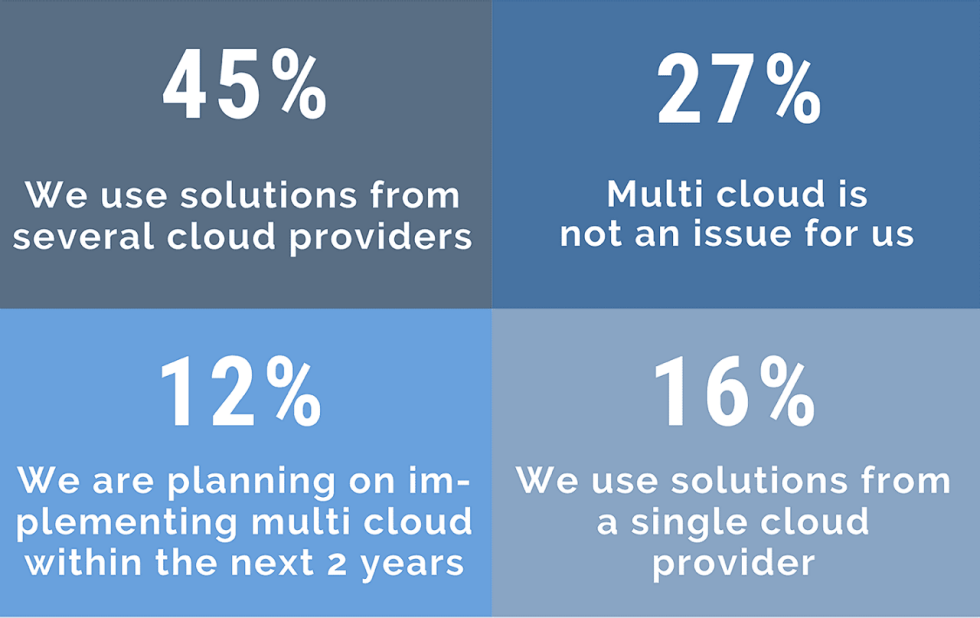Study by MSM Research AG
The multi cloud is on the rise
The new multi-cloud study by MSM Research shows: To remain competitive, companies also use services from several different cloud providers. This presents a challenge to IT service providers, in particular.
Text: Christoph Widmer, Images: Unsplash,
Economic downturns are also prompting Swiss companies to review their ICT spending, but this does not appear to be affecting investments in cloud infrastructure. In fact, the cloud is still on the rise. This was confirmed by the “ICT Operations and the Multi Cloud in Switzerland” study, which MSM Research conducted on behalf of Swisscom. Of the 53 companies surveyed in the study, 58% stated that their cloud spending will continue to increase this year, while 40% expect their investments to remain the same. That means one thing is certain: Pure ICT in-house operations are shrinking in favour of external services that are obtained via the cloud. “The cloud is certainly one of the winners of the coronavirus crisis,” states Philipp Ziegler, Managing Director of MSM Research. “The current shift from the workplace to the home office is prompting many companies to invest in cloud-based solutions for collaboration and communication – such as video conferencing”.
“The cloud is certainly one of the winners of the coronavirus crisis.”
Philipp Ziegler, Managing Director of MSM Research
While hybrid cloud architectures in particular have already found their way into Swiss companies, 45% of the companies surveyed are even focusing on the next level of cloud operating models: the multi cloud. For good reason: Not only does the use of multiple public and private cloud services from different providers contribute to greater security and cost reductions within the IT infrastructure; it also helps companies become more agile – the most important driving factor in the use of the multi cloud for the majority of the study’s participants. Thanks to its wide range of applications, the multi cloud makes it possible to respond to an extremely wide range of requirements from the specialist departments in an agile and needs-based manner. In doing so, it creates the basis for digitising business processes, shortening response times – and ultimately increasing a company’s competitiveness. “The wide range of cloud solutions also promotes the spread of the multi cloud, for example in the areas of artificial intelligence, blockchain, UCC or even analytics,” says Ziegler.

45% are already using multi-cloud-models today (MSM Research AG, 2020)
High expectations of ICT service providers
Despite all the advantages that the multi cloud brings with it, one thing is certain: The implementation as well as the operation of corresponding architectures is no easy task. Flawless interoperability as well as a holistic management of services from different providers and the company’s own on-premise architecture are basic prerequisites for a company to be able to leverage the benefits of the multi cloud. This may be one of the reasons why larger companies are usually the ones implementing multi-cloud infrastructures.
“The cloud has levelled the playing field in terms of the implementation and use of new solutions.”
Philipp Ziegler, Managing Director of MSM Research
Another aspect is the need to counteract the danger of heterogenisation – in other words, of an excessive shadow IT. “The cloud has levelled the playing field in terms of the implementation and use of new solutions,” explains Philipp Ziegler. “But from an ICT manager’s point of view, going it alone through specialist departments is not the best way. Without close cooperation with ICT specialists, new security risks and areas of attack can arise”.
Swiss companies are aware of these challenges – and have correspondingly high expectations of their ICT service provider: When using the multi cloud, they expect the provider to offer end-to-end consulting, coaching and support – both during the entire change management process and when operating the multi-cloud architecture. This also includes comprehensive security and monitoring services. The study not only mentions widespread standards, certificates and traceable audits as the basis for a successful partnership between cloud providers and user companies; the topic of Swissness also continues to play a key role in the choice of cloud providers. Not only for regulatory or legal reasons: SMEs in particular attach importance to short journey times and escalation paths in the event of faults – and thus to a provider based in Switzerland.

Newsletter
Would you like to regularly receive interesting articles and whitepapers on current ICT topics?
More on the topic:


